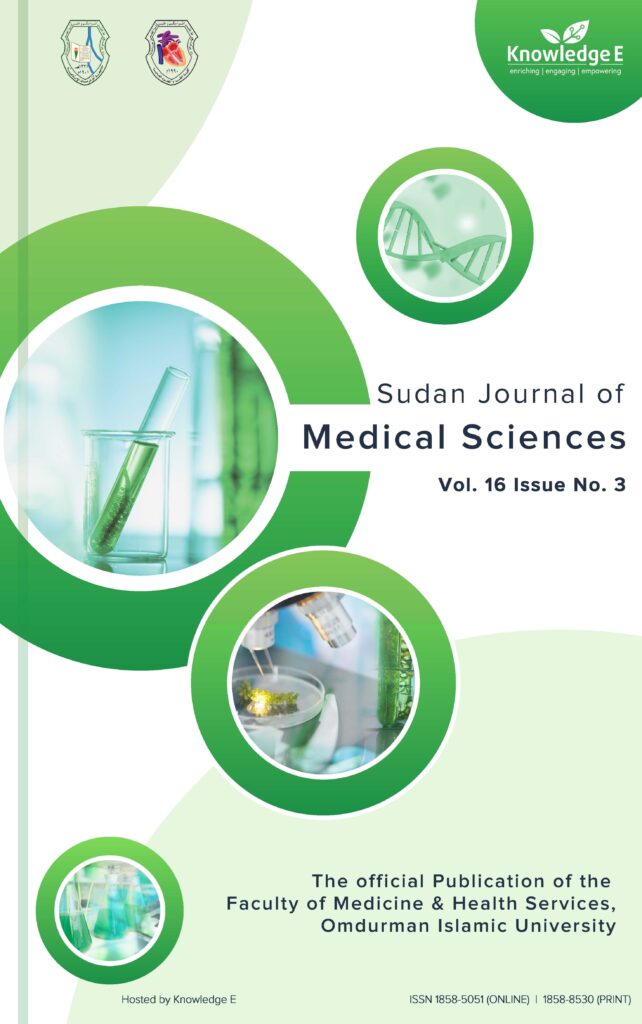
Sudan Journal of Medical Sciences
ISSN: 1858-5051
High-impact research on the latest developments in medicine and healthcare across MENA and Africa
Consolidating Medical Education in Sudan During War
Published date:Sep 27 2023
Journal Title: Sudan Journal of Medical Sciences
Issue title: Sudan JMS: Volume 18 (2023), Issue No. 3
Pages:402 - 412
Authors:
Abstract:
Background: Providing quality medical education in Sudan faces challenges due to armed conflicts. This short communication explores practical solutions for ensuring the continuity of medical education during the conflict in the Sudanese context.
Methods: A comprehensive literature review covered relevant articles published from 1915 to 2023. Four major databases (PubMed, Scopus, Web of Science, and Google Scholar) were searched using keywords related to medical education, war, armed conflict, and affected countries. Data synthesis identified common themes, challenges, and trends and suggested solutions for medical education in conflict zones. Case studies from Ukraine, Liberia, and Iraq were included for a comprehensive understanding.
Results: Collaborative alliances among medical schools facilitate resource sharing and support. Engaging the Sudanese diaspora through virtual collaborations, mentorship programs, and faculty exchanges enhance educational experiences. Stable regions as educational hubs ensure uninterrupted academic progress for students from conflict-affected areas. Online and remote education, including asynchronous learning and social media platforms, overcome access barriers and fosters knowledge sharing. Ambulatory teaching provides practical experience and adaptability. Prioritizing faculty well-being and professional development through training and support is crucial. Emphasizing resilience and adaptability in student education prepare them for healthcare delivery in resource-limited settings. Research and innovation contribute to evidence-based strategies. International collaboration and support offer opportunities for knowledge exchange and infrastructure improvement.
Conclusion: Implementing collaborative strategies and innovative approaches helps Sudanese medical schools overcome challenges during armed conflicts and maintain quality medical education. These solutions empower students and faculty, enhance resilience, and contribute to improving healthcare systems in post-war Sudan.
Keywords: armed conflicts, war, health professions education, medical education, Sudanese diaspora
References:
[1] Dobiesz, V. A., Schwid, M., Dias, R. D., Aiwonodagbon, B., Tayeb, B., Fricke, A., Pham, P., & Erickson, T. B. (2022). Maintaining health professional education during war: A scoping review. Medical Education, 56(8), 793–804. https://doi.org/10.1111/medu.14808
[2] Milton, S., & Barakat, S. (2016). Higher education as the catalyst of recovery in conflict-affected societies. Globalisation, Societies and Education, 14(3), 403–421. https://doi.org/10.1080/14767724.2015.1127749
[3] El-Sadig, S. M., El-Amin, S. O., El-Amin, R. O., Siddig, E. E., & Ahmed, A. Humanitarian Crisis in Sudan: The Collapsed Health System threats the public and global health. QJM An Int. J. Med. Oxford University Press; 2023;hcad085.
[4] Diehl, H. S. (1942). The role of medical education in the war. Academic Medicine, 17(6), 369–376. https://doi.org/10.1097/00001888-194211000-00005
[5] Marusic, M. (1994). War and medical education in Croatia. Academic Medicine, 69(2), 111–113. https://doi.org/10.1097/00001888-199402000-00005
[6] Challoner, K. R., & Forget, N. (2011). Effect of civil war on medical education in Liberia. Int. J. Emerg. Med. BioMed Central, 4(1), 1–4.
[7] Srichawla, B. S., Khazeei Tabari, M. A., Găman, M.-A., Munoz-Valencia, A., & Bonilla- Escobar, F. J. (2022). War on Ukraine: Impact on Ukrainian medical students. Int. J. Med. students. International Journal of Medical Students, 10(1), 15–17. https://doi.org/10.5195/ijms.2022.1468
[8] Barnett-Vanes, A., Hassounah, S., Shawki, M., Ismail, O. A., Fung, C., Kedia, T., Rawaf, S., & Majeed, A. (2016). Impact of conflict on medical education: A crosssectional survey of students and institutions in Iraq. BMJ Open, 6(2), e010460. https://doi.org/10.1136/bmjopen-2015-010460
[9] Khaniukov, O. O., Smolianova, O. V., & Shchukina, O. S. (2022). Distance learning during the war in Ukraine: Experience of Internal Medicine department (organisation and challenges). The Art of Medication, 23, 134–138. https://doi.org/10.21802/artm.2022.3.23.134
[10] Osman AKE. The transition from a vertical program to a health systems strengthening approach in the GAVI support to Sudan: literature. 2021;
[11] Aziz, M. I. A., Abdalla, S. I. A., Abuaffan, M., Awad, I. M. A., Elhassan, M., Elkheir, R. Y., . . .. Diasppora contribution to public health in Sudan. Int. J. Sudan Res. World Association for Sustainable Development; 2016;6(1).
[12] Young, L. A., & Park, R. (2009). Engaging diasporas in truth commissions: Lessons from the Liberia Truth and Reconciliation Commission Diaspora Project. The International Journal of Transitional Justice, 3(3), 341–361. https://doi.org/10.1093/ijtj/ijp021
[13] Balalian, A. A., Simonyan, H., Hekimian, K., & Crape, B. (2014). Adapting continuing medical education for post-conflict areas: Assessment in Nagorno Karabagh-a qualitative study. Hum. Resour. Health. BioMed Central, 12(1), 1–6. https://doi.org/10.1186/1478-4491-12-39
[14] Walsh, S., De Villiers, M. R., & Golakai, V. K. (2018). Introducing an E-learning solution for medical education in Liberia. Annals of Global Health, 84(1), 190–197. https://doi.org/10.29024/aogh.21
[15] Pei, L., & Wu, H. (2019). Does online learning work better than offline learning in undergraduate medical education? A systematic review and meta-analysis. Medical Education Online, 24(1), 1666538. https://doi.org/10.1080/10872981.2019.1666538
[16] Pander, T., Pinilla, S., Dimitriadis, K., & Fischer, M. R. (2014). The use of Facebook in medical education–A literature review. GMS Z. Med. Ausbild. German Medical Science, 31(3).
[17] Forgie, S. E., Duff, J. P., & Ross, S. (2013). Twelve tips for using Twitter as a learning tool in medical education. Medical Teacher, 35(1), 8–14. https://doi.org/10.3109/0142159X.2012.746448
[18] Iqbal, M. Z., Alradhi, H. I., Alhumaidi, A. A., Alshaikh, K. H., AlObaid, A. M., Alhashim, M. T., & AlSheikh, M. H. (2020). Telegram as a tool to supplement online medical education during COVID-19 crisis. Acta Inform. medica. Acta Informatica Medica, 28(2), 94–97. https://doi.org/10.5455/aim.2020.28.94-97
[19] Curran, V., Simmons, K., Matthews, L., Fleet, L., Gustafson, D. L., Fairbridge, N. A., & Xu, X. (2020). YouTube as an educational resource in medical education: A scoping review. Medical Science Educator, 30, 1775–1782. https://doi.org/10.1007/s40670- 020-01016-w
[20] Cantatore, F., Crane, L. H., & Wilmoth, D. (2016). Defining clinical education: Parallels in practice. Aust. J. Clin. Educ., 1, 1–8. https://doi.org/10.53300/001c.5087
[21] Schimbeno, V., Bosle, C., Stegmeier-Petroianu, A., Etminan, N., & Hoffmann, K. (2019). Competence-based teaching and learning in the outpatient clinic: Development of a clinical elective in ambulatory medicine. GMS J. Med. Educ. German Medical Science, 36(4).